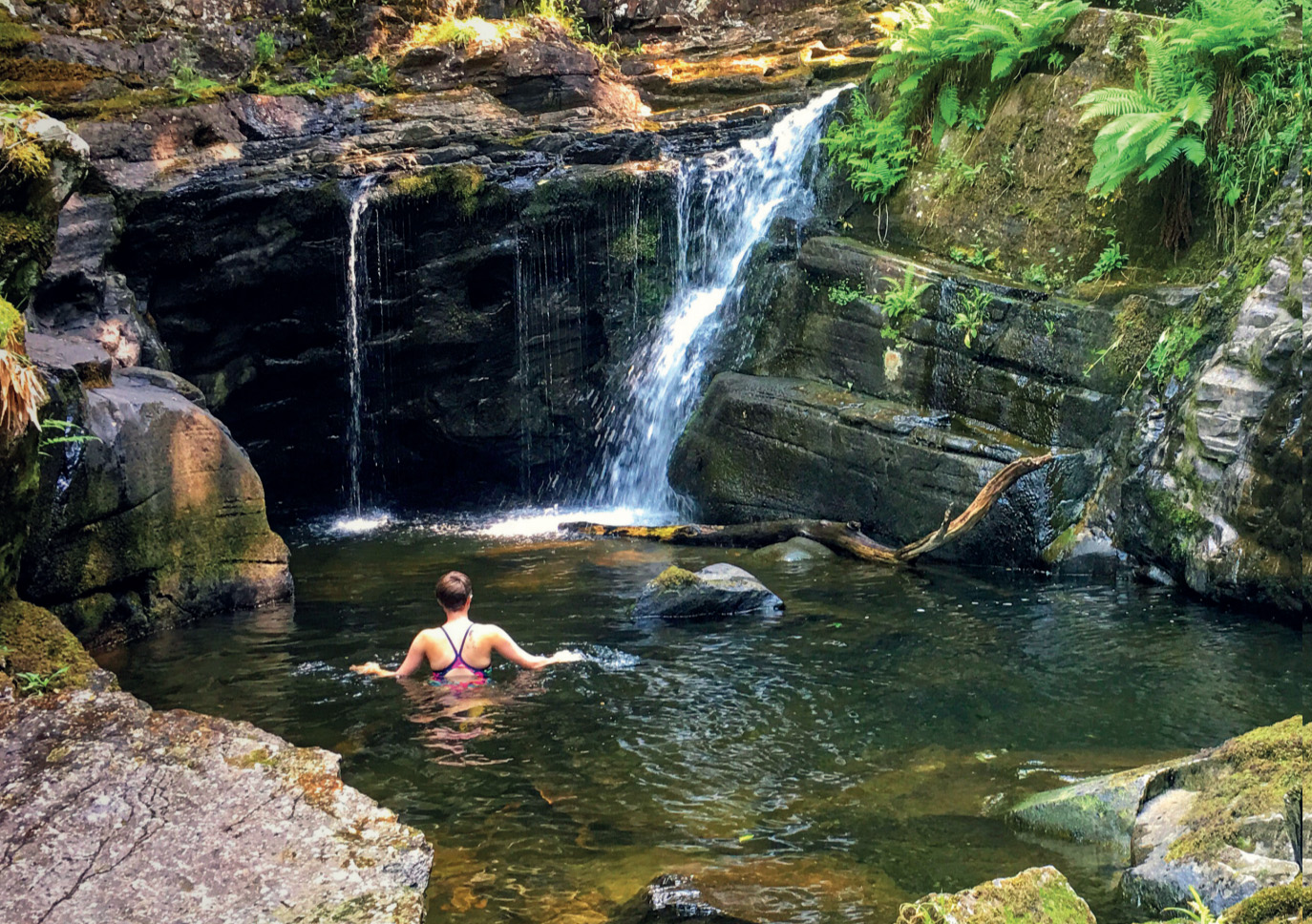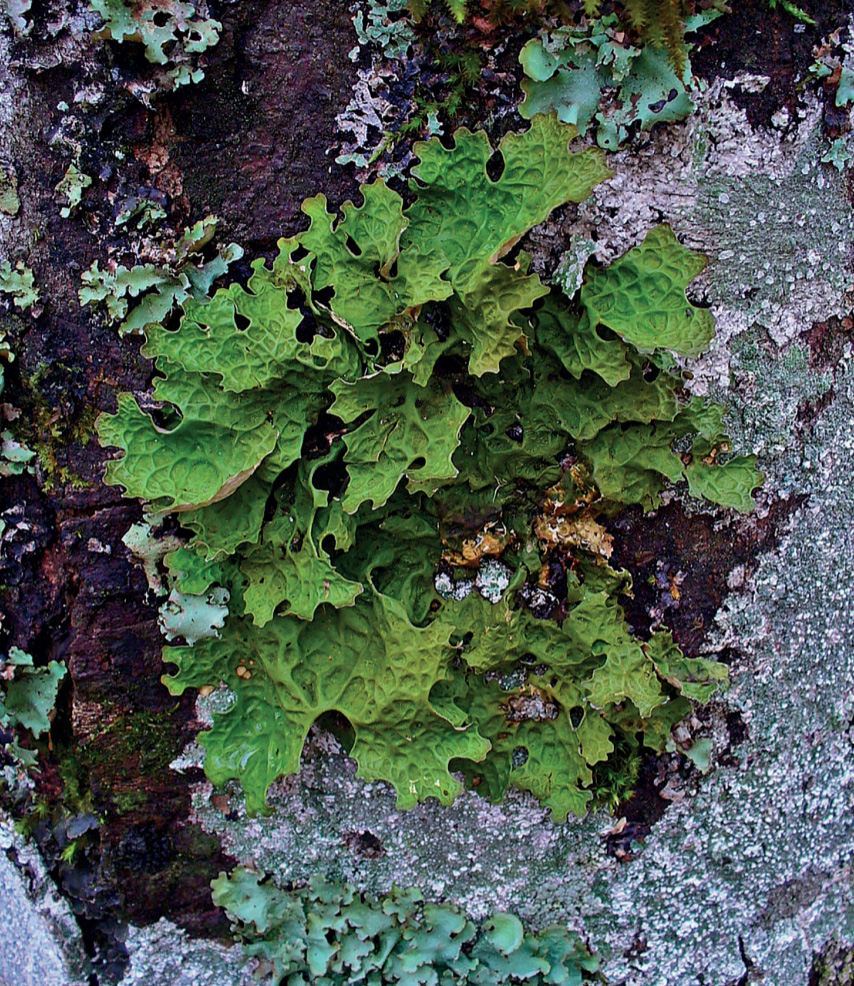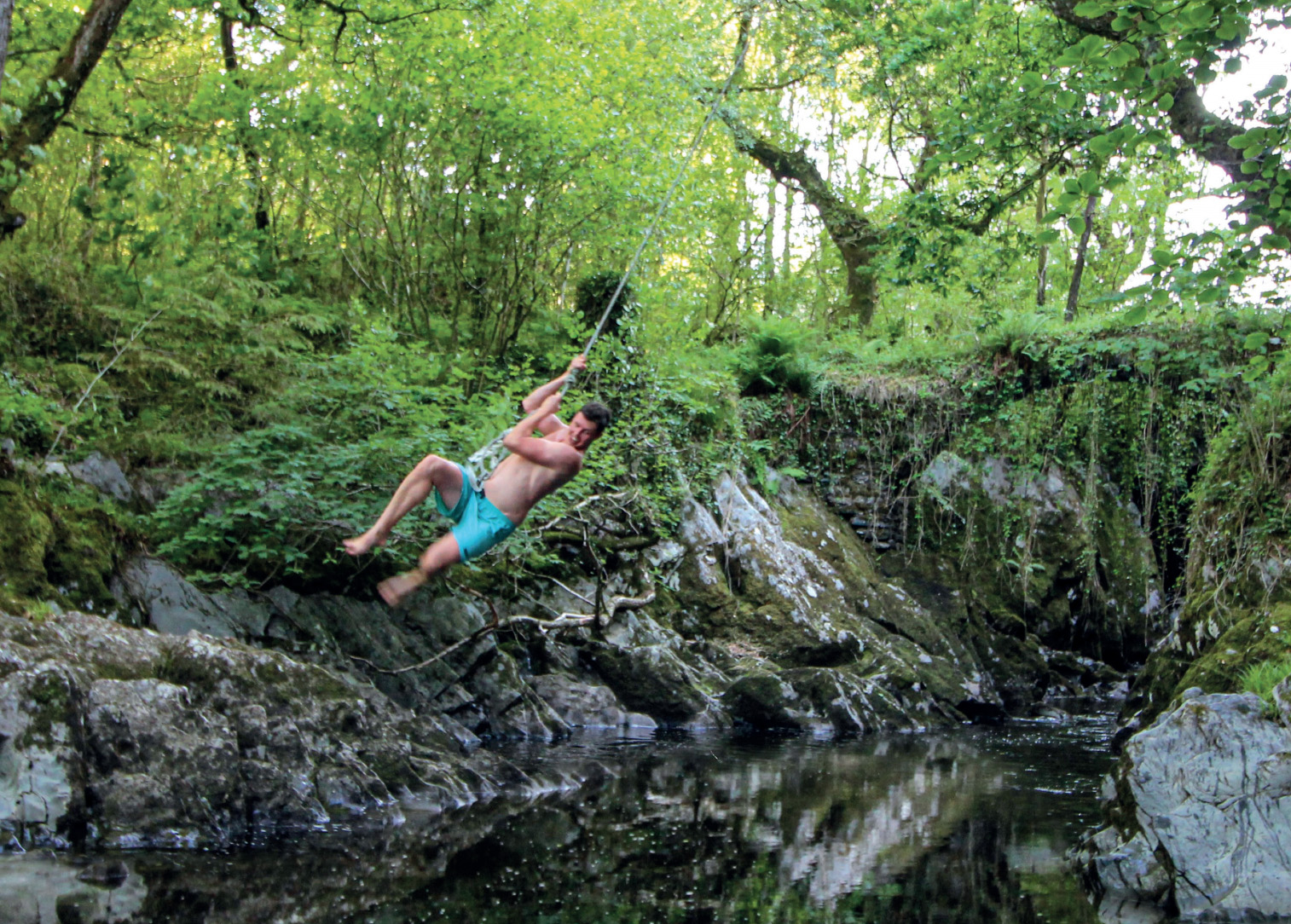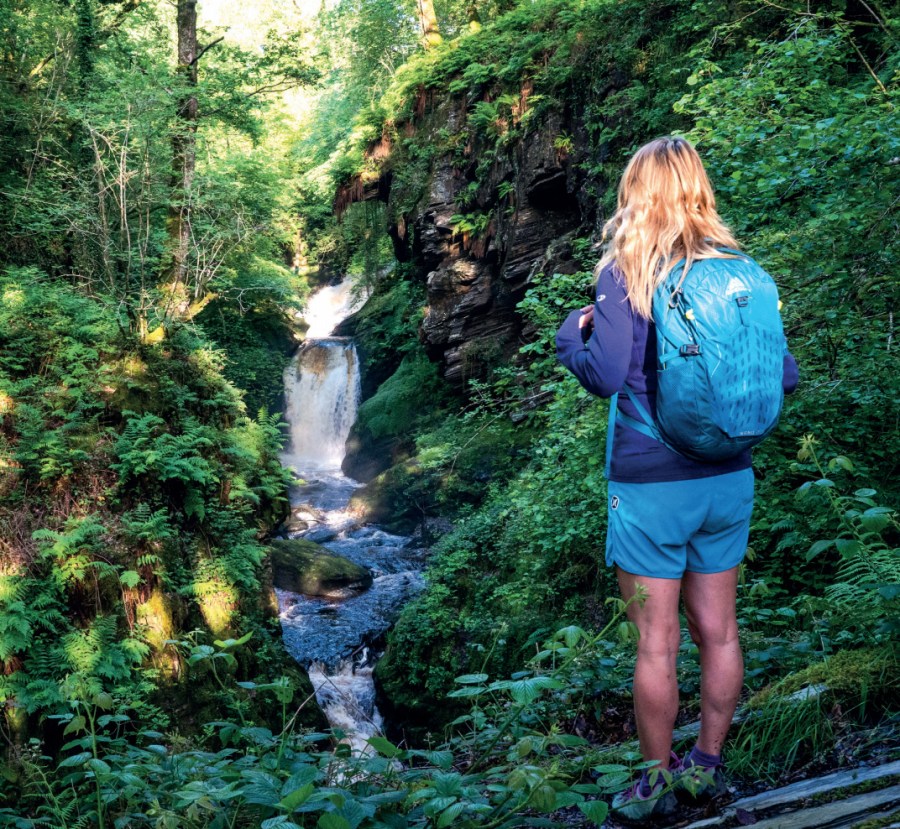Did you know that Britain has rainforests? Sarah Stirling delves into the wildwoods of Wales to discover an overlooked part of our natural heritage.
Just outside a back-of-beyond village, which suits its elvish-sounding name of Maentwrog, we take a breath and slip into the green. Twrog was a giant in Welsh legend; we are in a once illustrious place. High above us shimmies a roof of oak, ash and hazel leaves. Sunbeams criss-cross the space beneath. Time drowses up there, saturated with intoxicating, humid energy. The forest floor, meanwhile, thrums to the beat of a distant waterfall. Dappled light turns us green and shape-shifting.
When the last Ice Age retreated 10,000 years ago, temperate rainforest recolonised the west of Britain. The ‘wildwood’ was feared and revered in our folklore, until so much of it had been cleared for timber and farming that the balance of collective memory tipped. Scattered jigsaw-puzzle pieces survive. Until recently, these places lay forgotten; considered by most to be simply ‘woods’.

One of the many waterfall pools at Felinrhyd
But Felinrhyd is clearly no ordinary wood. The call of water draws us down to its heart, then we both stop, wide-eyed. A huge waterfall fans over a cliff into a dark pool. Trees, draped in joy-riding lichens, trail their branches in the spray. We follow the river downhill into a jungle of vibrant ferns and lurid mosses, then stop.
Below our feet, the water dives off a ledge between two rock walls, into a square swimming hole far below. Beyond that, there is another drop to another huge pool. This one is sunlit, translucent turquoise. It feels like we are standing at the gateway to an inaccessible lost world. Where are we?
WHAT IS A CELTIC RAINFOREST?
Back at home, I read up and learn that there are two types of rainforest: temperate and tropical. The former are rarer, now existing in just a few places around the world. They mostly survive on the wet and wild western fringes of places like Canada, Alaska, Patagonia, New Zealand … and the British Isles. Many people don’t know that our little islands shelter some of the best surviving examples of what used to be an extensive European rainforest. But what is Celtic rainforest, and what is just Welsh woodland?
“Celtic rainforests are difficult to define,” explains local expert Dave Lamacraft, from the charity Plantlife. I have purchased him a courgette cake in return for all he knows. “To a certain extent, it’s any natural or semi-natural forest growing in the temperate climate and sea air of Western Britain. Another key element is waterfalls: the spray is thrown up and the canopy locks the moisture in, creating a haven for temperate rainforest plants.”
Celtic rainforests are, I learn, worlds of miniature wonders. “Our rainforests are amongst the last refuges of some very rare lichen, moss, fern and liverwort colonies,” says Dave. “That’s what makes them particularly special.” I think back to Felinrhyd. Even the rocks were alive and vibrant: sprouting with weird, primitive organisms that resembled ears, gills, straggly beards. Every surface had been so full of life it seemed about to sprout legs.

The ‘Roman Bridge’ (actually thought to be a 17th century packhorse bridge) near Betwys-y-Coed offers a viewpoint into a forgotten world
A year ago, £8.6m in EU and Welsh Government funding was secured to restore Celtic Rainforests across Wales and return them to our collective memory. It will probably be one of Britain’s last EU-funded initiatives. The project is just kicking off, and there is little on the internet about it yet. Gethin Davies, from the Snowdonia National Park, is managing the project. He sends me a map, revealing all the sections of rainforests in Snowdonia, and I begin to explore.
THE MABINOGION MYTHS
During its heydays, I read, Felinrhyd witnessed a great battle. Pryderi, King of Dyfed, was killed there in mortal combat with a magician and is buried amongst the trees. You’ve read Harry Potter, but have you read the Mabinogion? These globally important masterpieces, written in Welsh from ancient oral tales, gave us Merlin, Arthur and a genre of fantasy fiction. But are they fiction?
In 1934, a man-sized slate was discovered in the bed of the River Cynfal, with a hole through it at heart height. In the Mabinogion, Blodeuedd plots to kill her husband Lleu; her lover Gronw hurls a spear at him on the banks of the Cynfal. Lleu is transformed into an eagle and later returns to Cynfal for vengeance. Gronw holds up a slate but Lleu’s spear goes right through it, killing him. The stone simply lay by the river for many years, but has recently been erected by the local council.
The fact that Cynfal stars in the Mabinogion suggests it to be an ancient and special place, just like Felinrhyd. I hurriedly pull my boots on. It turns out to be another magical gorge; a particularly narrow and deep one, which offers a different perspective: walking along the top and looking down into inaccessible, dark, jungly depths. Huge waterfalls have carved monumental shapes and rock pools. Some of the trees have been coppiced; the new shoots would make perfect spears.
I have lived in Snowdonia for three years and explored it, I’d thought, extensively on foot. But this quest is leading me to glorious underworlds that I never knew existed.
FLORA AND FAUNA
In order to learn more about what lives in Celtic rainforests, I visit Coed Ganllwyd, an important haven for rare species. Water sprites definitely play here when no-one else is around, as do I. Water gains speed down a narrow chute then splays into a huge slide over a deep, round rock pool. The sound is deafening. As I swim, rain bounces off leaves all around me and waterfall spray rises to meet it. Greenery nests in rock clefts and takes gallery seats on ledges, wafting in the haze.
As I dry off, I notice that the trees here are all wearing particularly vibrant socks. Closer inspection reveals these to be tiny, jostling communities. I have brought some photos with me, so I can identify them. I find a tree dressed in frills of rare tree lungwort, named after the lung tissue it resembles. It’s a certificate of vintage: they only like old trees and clean air.

Tree lungwort
I sniff hay-scented buckler-fern and marvel over delicate, one-cell-thick filmy fern. I seek out the combed-flat hair of rare prostrate signal moss – this is its main refuge in all of Europe. Ganllwyd is also one of the best sites in Britain for woodland lichens. I spot some wonderfully-named ones: blobby jelly-skin, elf ears, green satin and black-eyed Susan.
Pine martens were recently seen having a tea party in Ganllwyd, after a Century-long absence. They were encouraged to expand into the region with their favourite picnic: jam and eggs, which they can smell for miles. Polecat and fallow deer have also been spotted here. Wales’ Celtic Rainforests are also a haven for otters and many species of bat, including Britain’s most endangered one, the Greater Horseshoe Bat. These are signs of a rainforest that has been sensitively managed. In times of ecological crisis, it’s good to hear these stories.
HOW TO RESTORE A RAINFOREST
Now that I know what a healthy rainforest looks like, I return to Felinrhyd to see its dark side. I turn off onto a different path and meet eerily uniform trees. A section of ancient rainforest here was cleared to make way for a pine plantation in the 60s. The Woodland Trust has been slowly restoring the rainforest since 1992. The site is a useful study for the Celtic Rainforest restoration project.
Any changes must be made sensitively. Simply clearing the conifers would alter the microclimate too abruptly. Instead, the team clear ‘halos’ around old trees that have survived in the plantation, to encourage them to thrive.
One of the biggest problems Welsh rainforests face, though, is invasion from rhododendrons. Introduced to Britain in Victorian times, the plant thrives here, starves other species and is toxic to some of our native wildlife. The plan is to remove it from a two-kilometre buffer zone around each rainforest, so seeds won’t blow back in.

Taking a swing above the Afon Machno near the ‘Roman Bridge’
Another technique that helps restore a rainforest is light grazing. The neighbouring section of Felinrhyd, which is thriving, has supported a small flock of Welsh mountain ewes for generations. Before humans hunted them, native species would have browsed and grazed, keeping fast-growing plants in check, so other species weren’t choked. It’s a careful balancing act, though: too many sheep or cows and the rainforest’s regeneration would disappear.
I am amazed that the plantation at Felinrhyd can be restored. If that is true then I have high hopes that all Celtic rainforests can be nursed back to magical environments.
“It is possible to restore the plantation at Felinrhyd,” explains Kylie Mattock-Jones, who looks after the Woodland Trust’s estate in Wales, “Because the complex community of native micro-organisms and fungi that have evolved together do not disappear overnight. The hidden fabric of the ancient woodland, though partially damaged, remains.”
The complexity of forests has only recently begun to be understood. Underneath a forest, miles and miles of gossamer-fine fungal tubes connect all the plant and tree roots in a trading, communication and warning system: a Wood Wide Web. A Celtic rainforest, then, is a super-organism. That’s why a healthy one feels so buzzing with life. All that energy is a diverse range of resources and skills being being shared.
Pondering this, I walk back to the healthy part of Felinrhyd and sit at the bottom of the waterfall. Birds flit through, playing in sunbeams. In Welsh myths, it is in the wildwood that answers are often found, paradoxically, by getting lost. I realise that the question ‘what is a Celtic rainforest’ isn’t something that can be answered – it has to be felt.
This article is featured in the September 2019 issue of The Great Outdoors Magazine, along with walks to explore Snowdonia’s Celtic rainforests. Click here to order your copy or become a subscriber.







